Ex: http://mediabenews.wordpress.com/
Les décisions du Conseil de Sécurité des Nations Unies sont décrites comme « la volonté de la communauté internationale », et son appui à un programme national confère à ledit programme une autorité morale. Pour cette raison, il est crucial de comprendre les tactiques par lesquelles l’indépendance du Conseil de sécurité de l’ONU est souvent usurpée, et les méthodes de coercition, d’intimidation et de corruption utilisées pour extorquer l’approbation des membres réticents du Conseil de sécurité, ou de ceux des membres farouchement opposés à une action en particulier.

Il y a vingt-deux ans, à la suite de l’adoption du Conseil de sécurité des Nations Unies de la Résolution 678, qui a autorisé l’utilisation de « tous les moyens nécessaires » pour mettre fin à l’invasion irakienne du Koweït, et “approuvé” le lancement de la première guerre du Golfe Persique soutenue par les Nations Unies, l’ancien procureur général des États-Unis, Ramsey Clark, qui avait été témoin des conséquences dévastatrices de la guerre de bombardements massifs de Bagdad, a déclaré que « Les Nations Unies, qui ont été créées ‘afin de prévenir le fléau de la guerre’, sont devenues un instrument de guerre. »
Depuis l’effondrement de l’Union soviétique, le Conseil de sécurité s’est trouvé en danger de devenir un instrument pour porter des coups politiques, utilisé dans le but de « légitimer » les aventures néo-impériale, et la réaffirmation de la domination occidentale sur d’anciens territoires coloniaux en Afrique, en Asie, et au Moyen-Orient. Depuis 1991, le Conseil de sécurité des Nations Unies a souvent été décrit comme “un bras du Pentagone”, ou “une annexe du département d’Etat américain.”
En 1990, seuls deux pays au sein du Conseil de sécurité des Nations Unies s’opposent au passage de la Résolution 678, et quand le Yémen exprime son vote, l’ambassadeur américain menace effrontément : « Ce sera le vote le plus cher que vous ayez déjà exprimé », et le Etats-Unis coupent immédiatement l’aide de 70 millions de dollars au Yémen.
Plusieurs mois avant le vote, le 25 septembre 1990, M. Abou Hassan, ministre des Affaires étrangères de la Malaisie a déclaré devant le Conseil de sécurité :
« Nous ne pouvons pas ne pas nous sentir perturbés par cette course effrénée, par le remplacement d’une résolution par une autre dans les sept semaines. On peut se demander si le temps est donné à chaque résolution pour pouvoir prendre effet.
Allons-nous aussi vite pour rendre les sanctions efficaces, ou nous préparons-nous à une situation où nous devrons conclure que les sanctions ne sont pas efficaces et que d’autres mesures doivent donc être prises ? La Malaisie n’acceptera pas cette dernière solution. Nous n’acceptons pas que la guerre soit inévitable. [...] La Malaisie croit que notre sentiment de malaise est partagé par beaucoup en dehors du Conseil et que le Conseil devrait faire le point sur le chemin qu’il prend.
La Malaisie, par principe, est opposée à la participation des forces armées des grandes puissances dans une région … En tant que membre non-aligné et venant d’une région qui a été victime de batailles et de guerres menées par les armées des grandes puissances, nous craignons les conséquences d’une présence à long terme des forces militaires des grandes puissances. »
Le 25 septembre 1990, le ministre colombien des Affaires étrangères déclarait :
« Nous souhaitons avant tout appeler à la paix et à la réflexion … nous sommes certains que toute confrontation militaire serait une tragédie que nous regretterions le reste de nos vies. » Le jour suivant, l’ambassadeur de Colombie a déclaré : « Nous espérions qu’un projet de résolution en ce sens pourrait être soumis au Conseil avec notre co-parrainage dans les prochains jours. Le lendemain, nous avons soumis un projet de résolution, avec Cuba, la Malaisie et le Yémen, tenant compte des remarques faites par notre ministre des Affaires étrangères la veille. Mais la vérité est aussi que dès le lendemain toutes sortes de pressions ont commencé à être exercées pour nous amener à oublier notre texte … Qui plus est, on nous a donné à comprendre que notre projet n’avait pas eu l’approbation du Secrétaire général. Cela ne s’est pas avéré être le cas … La semaine dernière, afin d’arriver au texte final de ce qui est maintenant la résolution 674, des consultations intensives ont eu lieu qui nous ont laissés heurtés et frustrés et nous demandant de quelle façon fonctionne le Conseil de sécurité. Ma délégation ne porte pas de jugement sur ces procédures. Nous demandons à tout le monde ici de le faire, du fond de son âme, en gardant à l’esprit l’avenir de l’Organisation des Nations Unies et du monde, ce qui compte vraiment. »
Malgré la ferme opposition à l’action militaire exprimée par la Colombie et la Malaisie au cours des mois qui ont précédé le 16 janvier 1991, le secrétaire d’Etat James Baker était déterminé à forcer ces deux membres non permanents du Conseil de sécurité à soutenir la guerre, malgré leur point de vue. Baker a fait une visite éclair pour y arriver, et a dit au président colombien que son ambassadeur “devenait fou de ces initiatives de paix, et devait être arrêté”. Ceci était accompagné par la menace habituelle de couper l’aide. Baker a poursuivi le ministre malaisien des Affaires étrangères à son hôtel à Tokyo, et a réussi à le forcer à inverser sa position et à voter en faveur d’une action militaire contre l’Irak. Encore une fois les mêmes tactiques ont été utilisées, encore une fois avec succès.
Pendant les semaines précédant le 15 janvier 1991, le Président de l’Algérie avait voyagé à travers le Moyen-Orient et discuté avec les dirigeants de Syrie, Egypte, Jordanie, Oman, d’Irak et d’Iran. Il avait également parlé à deux reprises avec le conseiller du roi Fahd d’Arabie saoudite. Des sources diplomatiques haut placées, accréditées auprès de l’Organisation des Nations Unies, ont confirmé que les accords que le président algérien avait obtenu des dirigeants de chaque pays auraient conduit à une résolution pacifique du conflit en conformité avec les exigences de l’ONU. La dernière réunion devait avoir lieu avec le roi Fahd d’Arabie saoudite. Au dernier moment, le roi a refusé de rencontrer le président algérien, et lui a refusé un visa pour entrer en Arabie Saoudite, affirmant qu’ “il avait besoin de plus de temps”. Selon une source diplomatique haut placée, “Washington ne voulait pas de cette rencontre.”
Le 17 Janvier 1991, le président Bush déclarait que son but était la libération du Koweït, et non pas la conquête de l’Irak, affirmant en outre “nous sommes déterminés à assommer le potentiel d’armes nucléaires de Saddam Hussein. Nous allons aussi détruire ses installations d’armes chimiques”. En faisant ceci, les Etats-Unis se plaçaient eux-mêmes en violation d’une résolution de l’Assemblée générale de l’ONU (A/C.1/45/L.38) “interdisant les attaques contre les installations nucléaires”. Les tentatives d’appliquer cette résolution ont été contrées par les menaces des Etats-Unis et des autorités égyptiennes pour que ces efforts soient abandonnés.
L’article 22 de la Convention de La Haye déclare expressément illégale l’utilisation de “tous les moyens nécessaires”. La résolution 678 viole également les articles 25 et 27 de la Convention de La Haye, et viole les articles 1, 2a, 2b et l’article III c de la Convention d’interdiction des génocides. L’enquêteur des Nations Unies Martti Ahtisaari a révélé que les bombardements de la coalition avaient causé “des dégâts quasi-apocalyptiques, détruisant les infrastructures économiques nécessaires à la vie humaine en Irak”, avertissant que “le peuple irakien pourrait bientôt faire face à une nouvelle catastrophe imminente, qui pourrait comprendre épidémies et famines, si un soutien massif aux besoins vitaux n’est fourni.”
Le rapport du 15 Juillet de la mission humanitaire des Nations Unies à l’Irak, présenté par Sadruddin Aga Khan, stipule que : « Le lendemain de la guerre du golfe Persique de janvier et février 1991, se présentait à la communauté internationale un spectacle convaincant de souffrance et de dévastation. Les conséquences tragiques du conflit, la perte incalculable de vies et les destructions, ont été aggravés par des déplacements massifs de populations mal préparées, par les catastrophes écologiques d’une ampleur sans précédent, par l’effondrement des structures vitales des sociétés humaines actuelles [...]. Il est évident que pour un grand nombre de gens en Irak, chaque mois qui passe les rapproche du bord de la calamité. Comme d’habitude, ce sont les pauvres, les enfants, les veuves et les personnes âgées, les plus vulnérables parmi la population, qui sont les premiers à souffrir.”
L’échec de l’administration de George W. Bush d’obtenir du Conseil de sécurité des Nations Unies un soutien à “Shock and Awe”, attaque par bombardement de l’Irak en 2003, a sérieusement ébranlé la crédibilité et le moral de l’opération, et a affaibli la popularité de Bush au point où il devint l’objet de ridicule et sa “mission accomplie” raillée ; ce fut une partie du résultat visible et désastreux de cette guerre, et l’exposition des mensonges utilisés pour justifier la guerre est devenu un facteur majeur dans la campagne présidentielle réussie de Barack Obama.
Le 4 octobre 2011, le projet de résolution S/2011/612 du Conseil de sécurité des Nations Unies, qui recherchait l’approbation du Conseil de sécurité pour prendre des mesures punitives contre la Syrie, a été défait par les vetos émis par la Russie et la Chine.

Le Brésil, la Russie, l’Inde, la Chine et l’Afrique du Sud ont été outrés de ce que la Résolution 1973, autorisant une zone d’exclusion aérienne en Libye pour la seule fin de protéger les civils, ait été transformée en attaques de la Libye par l’OTAN, et en un soutien flagrant de l’OTAN à l’opposition libyenne, en violation grave du mandat de l’OTAN. En effet, l’ancien président de la Ligue arabe, Amr Moussa a appelé à une réunion d’urgence de la Ligue arabe, et a déclaré : “Ce qui se passe en Libye diffère de l’objectif d’imposer une zone d’exclusion aérienne, et ce que nous voulons est la protection des civils, et non le bombardement de davantage de civils.”
La résolution 1973 a abouti, en violation de son mandat, à un “changement de régime” et à l’assassinat sans procès de Mouamar Kadhafi, le président libyen, et à un résultat final d’innombrables violations du droit international, sous le couvert de la bénédiction donnée par la résolution 1973 du Conseil des Nations Unies pour la sécurité.
En guise d’explication de la voix de veto de la Russie le 4 octobre, le Représentant permanent de la Fédération de Russie a déclaré :
« Au sein du Conseil, la situation en Syrie ne peut pas être considéré séparément de l’expérience libyenne. La communauté internationale s’alarme à propos de la conformité de la résolution du Conseil de sécurité sur la Libye avec l’interprétation de l’OTAN ; ce doit être un modèle pour l’action future de l’OTAN pour mettre en œuvre la responsabilité de protéger …. La demande d’un cessez-le-feu rapide, transformé en une véritable guerre civile, les conséquences humanitaires, sociales, économiques et militaires dépassant les frontières libyennes. La situation concernant la zone d’exclusion aérienne, s’est transformée en des bombardements de raffineries de pétrole, de stations de télévision et d’autres sites civils. L’embargo sur les armes s’est transformé en un blocus naval de l’ouest en Libye, y compris un blocus des fournitures humanitaires …. En ce qui concerne la Syrie … la poursuite de cette tragédie ne peut pas être blâmée seulement pour les actions dures des autorités. Les événements récents montrent de façon convaincante que l’opposition radicale ne cache plus son penchant extrémiste et s’appuie sur des tactiques terroristes, en espérant des soutiens étrangers et agissant en dehors de la loi. Des groupes armés soutenus par la contrebande et d’autres activités illégales fournissent le matériel, se servent sur le pays, tuent et commettent des atrocités contre des gens qui respectent les autorités policières. »
Le veto russo-chinois qui a empêché le projet de résolution 612 n’était toutefois pas la fin de l’histoire. Ce fut le début d’une campagne furtive, et d’une campagne pas si furtive que ça, des USA et de l’OTAN pour forcer le Conseil de sécurité à soutenir son programme de soumettre et d’imposer un changement de régime en Syrie. Une pression constante sur la Russie et la Chine s’en est suivie pour qu’ils inversent leur position.
Peu après, les Etats-Unis, le Royaume-Uni, la France, l’Allemagne, le Japon, l’Arabie Saoudite, la Jordanie et 17 autres états ont coparrainé une résolution qui a été soumise à la Troisième Commission de l’Assemblée générale de l’ONU, condamnant les autorités syriennes pour les violations des droits humains, une résolution qui à aucun moment ne fait référence à des violations flagrantes des droits humains commises par l’opposition syrienne dans ce qui est rapidement devenu une guerre civile. Il était beaucoup plus facile et plus rapide d’obtenir une résolution condamnant les autorités syriennes adoptée par l’Assemblée générale, où de nombreux petits pays, plus faibles, seraient plus accessibles aux différentes formes d’influence que ne serait le cas au Conseil de sécurité. Une fois adoptée, la résolution de la Troisième Commission de l’Assemblée générale pourrait être utilisé pour faire pression, et si nécessaire servir de menace ou de chantage vis-à-vis des membres du Conseil de sécurité perçus comme récalcitrants par les puissances (USA et OTAN). La résolution intitulée « Situation des droits de l’homme dans la République arabe syrienne (A/66/462/Add.3) » a été adoptée le 19 décembre par un vote de 133 en faveur, 54 contre ou abstentions. Une pression extrême sur la Russie et la Chine a continué tout au long de décembre, lorsque la Russie a tenu la présidence du Conseil de sécurité.
Le 8 décembre, par une coïncidence fortuite, la Commissaire des Nations Unies pour les droits de l’homme, Mme Navi Pillay, était à New York, et l’ambassadeur français, Gérard Araud l’a priée de « venir faire un tour » et qu’elle informe le Conseil de sécurité sur la Syrie. De sérieuses questions ont été soulevées à propos de Mme Pillay, qui dépasserait le mandat de son office, et permettrait à son bureau d’être politisé. Il y a eu également des doutes sur son impartialité. Des questions ont été soulevées sur sa présence fortuite à New York, sur la justification de sa visite au Conseil de sécurité, et sur son accueil réellement à l’unanimité par les membres du Conseil. Brusquement, un grand nombre de journalistes se sont mis à fourmiller au Conseil de sécurité après qu’un « vote de procédure » avait été annoncé. Et puis le « vote de procédure » n’a pas eu lieu. Evidemment l’ambassadeur français avait menacé d’un vote procédural pour embarrasser la Russie et la Chine, et amener à Mme Pillay une toute autre audience au Conseil de sécurité.
Pour garder l’équilibre, l’ambassadeur de Chine a demandé instamment que la question de la Palestine soit également considérée, et que la communication de Mme Pillay porte aussi sur les problèmes urgents et graves des violations des droits humains au Moyen-Orient, non pas exclusivement en Syrie. Il y avait une opposition massive, par exemple des États-Unis, du Royaume-Uni, de la France et de l’Allemagne à inclure la Palestine dans le briefing de Mme Pillay – bien que ces représentants permanents aient insisté sur le fait qu’ils ne s’opposaient pas à inclure la Palestine dans ce briefing – qu’ils ont affirmés, indignés, que l’inclusion de la Palestine était une diversion, et une tentative de détourner l’attention des problèmes en Syrie., Lorsqu’on a demandé à l’ambassadeur de Russie, Président du Conseil de sécurité, s’il avait rencontré une opposition à l’inclusion de Palestine dans le briefing, il a répondu : “Ce que signifie opposition peut devenir une discussion linguistique … j’ai vu chacun des trucs dans le livre qui m’a été présenté, scénarii pour étrangler le président du Conseil de sécurité. “
L’ambassadeur de Russie a fait une déclaration à la presse concernant l’absurdité de cet imbroglio au sein du Conseil de sécurité : “dans certain texte de science-fiction il y avait un petit poème. Il est difficile de traduire des poèmes du russe en anglais, mais c’est devenu quelque chose comme ceci : « Ce matin, une fusée a été lancée. Elle vole à seize fois la vitesse de la lumière, de sorte qu’elle atteindra sa destination à 18 heures … hier. »
Après le briefing, Mme Pillay a parlé brièvement à la presse, alléguant que le 12 décembre, il y avait eu 5.000 morts en Syrie, dont 300 enfants, qu’il y avait des milliers de personnes en détention, qu’on avait torturé, et elle a recommandé que les autorités de la Syrie soient soumises à la Cour pénale internationale pour crimes contre l’humanité. A aucun moment Mme Pillay n’a identifié la source de son information, et elle est partie avant que j’aie eu l’occasion de prendre des renseignements sur l’identité de ses sources. Puis les Français, les représentants britanniques, portugais et américains ont parlé à la presse réitérant qu’il était « inconcevable que le Conseil de sécurité n’ait pris aucune mesure » et « insupportable que le Conseil soit obligé de garder le silence » au vu des révélations effroyables Mme Pillay. »
J’ai finalement été en mesure de demander au Représentant permanent britannique, Mark Lyall Grant quelle avait été la source d’information de Mme Pillay, et on m’a dit que la source des détails horribles du Commissaire des Nations Unies pour les Droits de l’Homme était 233 membres défectifs de l’armée. Laissant de côté les différentes motivations possibles des membres défectifs de l’armée qui pourraient avoir déformé l’information, l’absence de fourniture par Mme Pillay de toute information sur d’éventuels actes de violence commis par l’opposition, et sa focalisation exclusive sur les violences commises par le gouvernement soulève des questions extrêmement sérieuses au sujet de son objectivité, et de la convenance et de la légalité de l’imprimatur donné par son bureau au profit d’une seule partie dans ce qui est essentiellement une guerre civile. Mme Pillay a fait valoir qu’elle n’avait pas accès à la Syrie. Comment alors est-elle en mesure de fournir une analyse crédible sur les témoignages à propos de violences commises par le gouvernement syrien ? Le Président du Conseil a rappelé à la presse que le 3 août, il y avait eu des rapports suivant lesquels la marine syrienne avait tiré sur l’opposition. Des témoins russes résidant en Syrie ont désavoué ces rapports. Par la suite, aucune mention n’a été faite sur cette divergence, et Mme Pillay n’a jamais investigué sur les rapports présentés par les témoins russes contestant les accusations contre la marine syrienne.
Le 18 décembre, le New York Times rapportait d’horribles morts de civils en raison des frappes de l’OTAN sur la Libye. Le 19 décembre le Secrétaire général Ban Ki-moon, a d’abord nié ces rapports. L’après-midi, dans une mise au point, le Président du Conseil a indiqué que les affirmations de l’OTAN (de zéro victime civile) étaient cruelles et cyniques. L’OTAN était évidemment réticente ou incapable d’enquêter de manière efficace sur les résultats des 7700 bombes ou missiles qu’il a lancés sur la Libye. Le New York Times a déclaré :
« Un examen sur le terrain par le New York Times à propos des raids aériens sur la Libye – y compris des entrevues avec des survivants, des médecins et des témoins, et la collecte des restes de munitions, les rapports médicaux, les certificats de décès et des photographies – rend compte de dizaines de civils tués par l’OTAN dans de nombreuses attaques distinctes. Les victimes, dont au moins 29 femmes ou enfants avaient touchés par les tirs durant leur sommeil … Suivant ce que l’OTAN racontait pendant la guerre, et dans les déclarations subséquentes jusqu’au 31 octobre, l’opération dirigée par l’Alliance aurait été presque impeccable – un modèle de guerre aérienne qui utilise la haute technologie, la planification minutieuse et toute retenue pour protéger les civils des troupes du colonel Kadhafi, ce qui était le mandat de l’alliance. « Nous avons effectué cette opération très précautionneusement, sans perte civile confirmée », a déclaré en novembre le Secrétaire général de l’OTAN, Anders Fogh Rasmussen. Le président du Conseil de sécurité a déclaré que « les Nations Unies devraient aider à enquêter sur les victimes civiles, si l’OTAN ne peut pas faire cela elle-même ».
Alors que le Président du Conseil de sécurité avait déclaré le 9 décembre que les pressions exercées sur lui par les Etats-Unis, le Royaume-Uni, la France et l’Allemagne au sein du Conseil de sécurité avait « failli l’étrangler », le 16 décembre un avis aux médias a été envoyé au corps de presse de l’ONU par Fehmi Khairullah de la « Syria First Coalition », une organisation américaine (la source de son financement n’est pas claire) … annonçant la Journée syrienne de protestation, en déclarant : « le régime syrien tue son propre peuple avec le soutien de la Fédération de Russie au régime criminel syrien ». L’avis aux médias annonçait des manifestations « pour protester contre le soutien de la Russie du régime pénal syrien », a eu lieu le vendredi 16 décembre 2011 de 15 heures jusqu’à 17 heures devant la Mission russe auprès des Nations Unies, 136 East 67 Street, New York 10065 ; les manifestants faisant partie du « Rassemblement des syriens indignés, pour condamner le soutien continu des russes au régime syrien criminel ».
La pression sur le Président du Conseil de sécurité de l’ONU au sein du Conseil de sécurité lui-même, qui, selon ses mots « se sont arrêtés juste avant de l’étrangler », a été complétée par des manifestations de la « Syria First Coalition » devant la mission russe à l’ONU, et une lettre adressée à l’ambassadeur russe, accusait : « Votre droit de veto au sein des Nations Unies soutient non seulement le régime meurtrier, mais aussi bloque toute aide humanitaire à la population désespérée de la Syrie, qui est dans un froid glacial, affamée, apeurée et sans fournitures médicales. » La lettre qui faisait état de 5078 syriens tués ne mentionne pas que cela inclut les 1000 officiels du gouvernement syrien tués par l’opposition, un chiffre admis, même par Mme Navi Pillay, haut Commissaire des droits de l’Homme.
Le 22 décembre, dans la mise au point du Conseil de sécurité, le Président du Conseil a été contraint de défendre son inscription dans l’agenda de décembre du Conseil de sécurité d’une discussion sur les violations des droits humains du peuple palestinien, et sur la question cruciale de civils libyens tués par frappes de l’OTAN. Evidemment le groupe USA / OTAN a exigé que seule la question de la Syrie figurât sur l’ordre du jour du Conseil de sécurité.
L’ambassadrice américaine Susan Rice, indignée de ce que le Conseil de sécurité ait pointé le doigt sur la mort de 70 civils libyens à la suite du bombardement de la Libye par les USA et l’OTAN, a déclaré : « Bienvenue à l’exagération. J’étais récemment en Libye, et le peuple libyen a exprimé son immense gratitude pour l’aide de l’OTAN. » L’ambassadrice Rice a évidemment négligé de rencontrer Mustafa Naji al Morabit, victime parmi beaucoup d’autres de frappes aériennes de l’OTAN. Selon le New York Times, « Le 4 août une bombe éclate dans le petit matin calme et percute leur maison provoquant la chute de la façade. L’épouse de M. Morabit, Eptisam Ali al-Barbar, est décédée le crâne écrasé. Deux de leurs fils, Mohammed, 6 ans et Moataz, 3 ans, ont été tués aussi. Trois orteils du pied gauche de Fatima Omar Mansour, la mère de M. Morabit, ont été amputés, et sa jambe gauche a été brisée. »
« Le 8 août, quatre jours après la destruction de la maison des Morabit, selon les survivants, les médecins et des enquêteurs indépendants, l’OTAN a frappé des bâtiments occupés par des civils, cette fois dans la Majer. Ces attaques ont été les accidents les plus sanglants connus de la guerre de l’OTAN. L’attaque a commencé avec une série de bombes à guidage laser de 500 livres, a appelé GBU-12, comme le suggère les restes des munitions. La première maison, d’Ali Hamid Gafez, 61 ans, qui était bondée avec des proches de M. Gafez, a été disloquée par l’attaque, suivant ses voisins et lui-même. La bombe a détruit le deuxième étage et une grande partie du premier. Cinq femmes et sept enfants ont été tués, plusieurs autres personnes ont été blessées, dont l’épouse de M. Gafez qui a du être amputée de la jambe gauche, suivant le médecin qui a effectué cette opération. Plusieurs minutes après la première frappe, alors que les voisins accourraient pour creuser à la recherche des victimes, une autre bombe a frappé. L’explosion a tué 18 civils, suivant les deux familles … Les premières constatations sur les attaques Majer, qui font partie de l’enquête des Nations Unies sur les actions de toutes les parties en Libye où des civils ont été blessés, ont soulevé des questions sur la légalité de l’attaque en vertu du droit international humanitaire, selon un fonctionnaire proche de l’enquête. »
Le 23 décembre, le président du Conseil de sécurité a tenu une conférence de presse au cours de laquelle il a décrit l’Ambassadrice Rice « d’une rhétorique inhabituellement explosive », et la violence dans la discussion de l’ambassadeur russe sur les civils libyens abattus par des frappes aériennes de l’OTAN. Il a déclaré qu’il était nécessaire de répondre au déchaînement de l’ambassadrice Rice qui « a sombré dans des abus de langage ». Il a cité les accusations du 22 décembre de l’ambassadrice Rice de « grandiloquence, fausses revendications, un truc pas cher, duplicité, redondant et superflu », tous les gros mots utilisés par l’ambassadrice Rice à propos des discussions de l’ambassadeur de Russie sur les victimes civiles de la Libye par les bombardements de l’OTAN. L’ambassadeur de Russie fait alors remarquer : « Vous ne pouvez pas battre une éducation à la Stanford, vous savez ? »
L’ambassadeur de Russie a déclaré que dans le Conseil de sécurité n’y avait pas eu de demande d’enquête sur les victimes civiles des bombardements libyens de l’OTAN, et la question avait été totalement ignorée. Il a également rappelé à la presse que le président Obama avait déclaré qu’il voulait le dialogue avec les Nations Unies et le Conseil de sécurité. Il a ajouté que dans ce cas, il suggère que le « Dictionnaire de jurons de Stanford soit remplacé par quelque chose de plus victorien. »
En réponse à une question sur la dégradation des relations de travail entre les cinq membres permanents du Conseil de sécurité, dans une atmosphère d’acrimonie au sein du Conseil de sécurité, l’ambassadeur russe a déclaré qu’il s’inquiétait de ce que le « Conseil de sécurité n’évolue pas dans la bonne direction », qu’il y avait des membres qui sont inflexibles, qui demandent que « les choses se fassent à leur manière et non pas autrement », qui ne prennent pas d’autres points de vue en considération, et doivent avoir ce qu’ils demandent immédiatement. Cela « nuira à la capacité du Conseil de sécurité à travailler. ». Il a déclaré que l’action du Conseil de sécurité pour mettre fin à la violence en Syrie ne doit en aucun cas être un « auxiliaire de changement de régime politique », comme s’était avérée la résolution 1973 du Conseil de sécurité sur la Libye. Il a dit que le changement de régime conçu et forcé de l’extérieur du pays est « inévitablement destructeur, entraînant des effusions de sang, et ni le Conseil de sécurité ni les Nations Unies ne devraient avoir rien à voir avec cela. » Il a déclaré que, à 11 heures ce matin la Fédération de Russie avait présenté son troisième projet de résolution sur la Syrie, et que « nous ne passerons pas sous silence la violence causée par l’opposition extrême et ne ferons pas appel à des sanctions ou un embargo sur les armes, car en Libye l’embargo sur les armes n’a d’impact que pour le gouvernement, car l’opposition a reçu illégalement des livraisons d’armes massives de beaucoup de sources.
Le sort du troisième projet de résolution soumis par la Russie le 23 décembre est encore indéterminé. A ce jour, des amendements et suppressions sont demandées par les USA et les pays de l’OTAN pour transformer cette résolution en quelque chose de méconnaissable, exactement à l’opposé de son intention première. Leurs projets actuels comprennent :
« Soulignant la nécessité de résoudre la crise actuelle en Syrie pacifiquement, et soulignant que rien dans la présente résolution oblige les États à prendre des mesures ou des actions dépassant le cadre de la présente résolution, y compris l’usage de la force ou la menace de la force » (Royaume Uni)
Supprimé du projet de résolution russe original : « Exclure toute intervention militaire de l’extérieur »
« Exige pour que le gouvernement syrien réponde à sa responsabilité de protéger sa population, de mettre immédiatement fin aux attaques contre ceux qui exercent leurs droits à la liberté d’expression, de réunion et d’association pacifiques et de respecter pleinement ses obligations en vertu du droit international applicable ».
Supprimé de ce projet de résolution russe d’origine : « Exige que les groupes armés d’opposition de l’opposition syrienne stoppent les violations des droits humains et les attaques terroristes contre les civils, les institutions étatiques, et contre le personnel et les membres des familles de l’armée et des forces de l’ordre. »
Supprimé de la résolution projet russe d’origine : « Prie instamment les responsables syriens de l’opposition à se dissocier des extrémistes, d’accepter l’initiative de la Ligue des États arabes et de s’engager dans un dialogue substantiel, sans conditions préalables et en profondeur avec les autorités syriennes sur les façons de réformer les autorités syriennes. “
Les Etats-Unis ont exigé les modifications :
Interdiction de voyage et gel des avoirs, pour 19 responsables syriens nommés
Gel des avoirs du gouvernement de la Syrie, y compris de la Banque centrale Syrie et des banques commerciales syriennes
Interdiction de transactions commerciales gouvernementales avec la Syrie, à l’exception des produits stratégiques qui affectent le peuple syrien
Interdiction des vols de / vers la Syrie
Embargo sur les armes (US / Royaume-Uni)
Supprimé de la résolution projet russe d’origine : « Décide que rien dans cette résolution ne doit être interprété comme une autorisation d’ingérence militaire de toute sorte en Syrie par n’importe qui. »
Dans tout cela est remarquablement ignoré le gorille de 300 kg dans le salon ! Le 17 mars, la résolution 1973 sur la Libye a été adoptée au Conseil de sécurité des Nations Unies, et le bombardement de l’OTAN de la Libye a immédiatement suivi. Le lendemain, le 18 mars, des manifestations anti-gouvernementales ont commencé en Syrie. Le 18 avril 2010, la une du Washington Post rapportait :
« Les Etats-Unis fournissent un soutien secret à l’opposition syrienne. Leaked Cables révélait un financement. “Le Département d’Etat a secrètement financé des groupes politiques d’opposition syriens et des projets connexes, y compris une chaîne de télévision par satellite qui diffuse une programmation anti-gouvernementales dans le pays … Barada TV est étroitement liée avec le Mouvement pour la Justice et le Développement, un réseau de syriens exilés basé à Londres. Des câbles diplomatiques américains montrent que le Département d’Etat a déversé pas moins que 6 millions $ au groupement pour faire fonctionner le canal satellite et financer d’autres activités à l’intérieur de la Syrie … Les dirigeants du Mouvement pour la Justice et le Développement sont d’anciens membres des Frères musulmans …. Plusieurs câbles diplomatiques américains de l’ambassade à Damas révèlent que les exilés syriens ont reçu de l’argent d’un programme du Département d’Etat a appelé le “Middle East Partnership Initiative.” Selon les câbles, le Département d’Etat a versé de l’argent au groupe d’exilés via Democracy Council, une association à but non lucratif de Los Angeles. Selon son site Internet, Democracy Council parraine des projets au Moyen-Orient, en Asie et en Amérique latine afin de promouvoir les « éléments fondamentaux de sociétés stables ». Le fondateur du conseil et président, James Prince est un ancien membre du personnel du Congrès et conseiller en placement chez Price Waterhouse Cooper… Edgar Vasquez, un porte-parole du Département d’Etat a déclaré que le Middle East Partnership Initiative a alloué 7,5 millions pour les programmes syriens depuis 2005. Un câble de l’ambassade à Damas, cependant, souligne un total beaucoup plus élevé – environ 12 millions $ entre 2005 et 2010 ».
Le financement américain et l’implication dans la déstabilisation de gouvernements indépendants à travers le monde suivent un modèle semblable tout au long de leur longue histoire, depuis la déstabilisation et le renversement du gouvernement démocratiquement élu de Mossadegh en Iran en 1953, à la déstabilisation et le renversement d’une longue succession de présidents démocratiquement élus : Arbenz au Guatemala, Juan Bosch en République Dominicaine, Goulart au Brésil, Soekarno en Indonésie, Allende au Chili (avec la célèbre déclaration de Kissinger « Nous ne pouvons pas permettre au Chili de devenir communiste à cause de l’irresponsabilité de son propre peuple »). Dans tous les cas, ces gouvernements démocratiquement élus, ne dépendant pas d’un contrôle de sociétés américaines, ont été remplacés par des dictatures militaires qui ont institutionnalisé la torture, et placé les économies de leurs pays sous le contrôle des multinationales basées aux Etats-Unis, appauvrissant leurs propres citoyens.
Le modèle actuel émergeant au Moyen-Orient laisse présager des développements inquiétants dans une trajectoire qui devient évidente. L’autorisation par Conseil de Sécurité de l’ONU de « toutes les mesures nécessaires » dans la résolution 1973 contre le gouvernement libyen a permis une sanglante agression impérialiste inadmissible.
New York Times, 21 août 2011.
« La coordination entre l’OTAN et les rebelles, et entre les groupes rebelles vaguement organisés eux-mêmes, est devenue plus sophistiquée et mortelle dans les dernières semaines, même si le mandat de l’OTAN avait été simplement de protéger les civils, et de ne pas prendre parti dans le conflit … dans le même temps, la Grande-Bretagne, la France et les autres nations ont déployé des forces spéciales sur le terrain en Libye pour aider à former et à armer les rebelles.”
Le renversement de Mossadegh en Iran est décrit en détail par Robert Dreyfus dans « Devil’s Game : How the United States Helped Unleash Fundamentalist Islam » (page 109) :
« Mossadegh fait passer la nationalisation de la compagnie pétrolière anglo-perse (APOC). Ce fut un coup catastrophique pour l’Angleterre … L’APOC avait été la fierté et la joie des biens impériaux de Grande-Bretagne. Mossadegh est devenu instantanément un homme détesté par Londres. L’histoire du coup d’état, géré conjointement par la CIA et le M16 a été décrite à plusieurs reprises. Presque jamais signalé, cependant, est le fait que les deux agences de renseignement ont travaillé étroitement avec le clergé de l’Iran, les oulémas, pour affaiblir et finalement renverser Mossadegh. Un rôle crucial a été joué par les foules de la rue, achetées et payées par la CIA et mobilisées par des agitateurs liés à des oulémas, qui ont exigé la démission du Premier ministre Mossadegh et le retour du Shah. L’ayatollah Kashani, le représentant en chef des Frères musulmans en Iran, a été une figure centrale dans la campagne. “
Si le Conseil de sécurité adopte n’importe quelle résolution qui pourrait se transformer en une autorisation permettant « toutes les mesures nécessaires » pour être utilisée pour justifier une action militaire en vue de forcer un changement de régime en Syrie, ce serait masqué par une feuille de vigne de préoccupation pour les « droits humains » du peuple syrien, dans une guerre civile provoquée par les encouragements d’une opposition préfabriquée par les USA et l’OTAN. Cela devrait inévitablement aboutir, comme en Libye, en une « coordination entre l’OTAN et l’opposition », et permettrait d’éliminer la dernière barrière aux grandioses desseins impériaux des USA et de l’OTAN. Cela déclencherait des fantasmes pathologiques de domination mondiale longuement chéris par le russophobe Brzezinski, et d’autres décideurs politique de la même trempe, la rupture de leurs contact précaires avec la réalité, et lancerait les puissances des USA et de l’OTAN dans les erreurs fatales de Napoléon et d’Hitler, la psychose avérée. Une résolution du Conseil de sécurité de l’ONU qui pourrait être interprétée comme permettant une action militaire des USA et de l’OTAN contre la Syrie propulserait ces forces, déjà ivres de pouvoir, à la prochaine recherche d’une résolution autorisant une action militaire contre l’Iran.
La Libye, la Syrie et l’Iran ont beaucoup de pétrole et encore pas d’armes nucléaires. Toute action contre l’Iran, qu’elles soient menées par les USA, l’OTAN ou Israël, déclencherait une conflagration impossible à contrôler, impliquant potentiellement des états nucléaires, et il serait impossible de déterminer ou de restreindre la direction dès le départ. Et le point final de cette trajectoire serait inévitablement la Russie, qui contrôle d’énormes réserves de pétrole et de gaz convoitées par l’Occident. Mais contrairement à l’aventure insensée de Napoléon et d’Hitler, avant l’ère atomique, aujourd’hui la Russie possède des armes nucléaires, est entourée par des pays de l’OTAN hostiles et est confrontée à la menace de la défense antimissile de l’OTAN. La Russie, dont l’existence est menacée désormais, a abandonné la doctrine de l’Union soviétique de « non utilisation en premier des armes nucléaires ».
Si la Russie résiste à une pression croissante et continue d’interdire toute résolution du Conseil de Sécurité de l’ONU autorisant “tous les moyens nécessaires” contre la Syrie, cela peut être le moment où, privés du soutien du Conseil de sécurité des Nations Unies, et incapables de prétendre qu’ils agissent en conformité avec « la volonté de la communauté internationale », la force psychologique des US et de l’OTAN sera épuisée, comme le fut Napoléon à la bataille de Borodino en1812, et Hitler à Stalingrad en 1943. La route vers une troisième guerre mondiale aura été bloquée, et le Conseil de sécurité des Nations Unies se sera racheté de son statut actuel d’instrument de guerre.
Carla Stea
————————————————
Carla Stea est une journaliste accréditée auprès du Département d’Etat américain et des Nations Unies. Ses articles ont été publiés aux Etats-Unis, au Royaume-Uni, en Russie, en Amérique latine, et ont paru dans Latin American Perspectives, Covert Action Quarterly, War and Peace Digest, Rock Creek Free Press, Komsomolskaïa Pravda, Rabotchaïa Tribuna, Sovetskaya Rossia, Novosti Press, et Tapol, Rapport sur les droits de l’homme, Indonésie.
Source : Libya 360
Traduit de l’ anglais par jean-Pierre Geuten
Source : michelcollon.info




 del.icio.us
del.icio.us
 Digg
Digg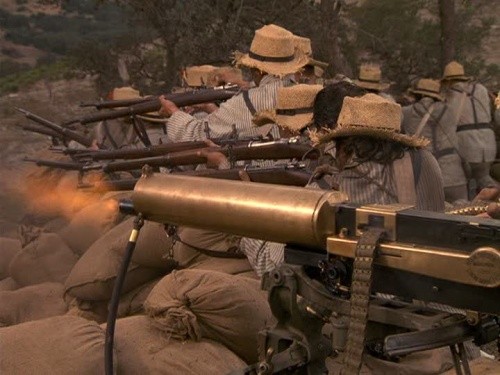






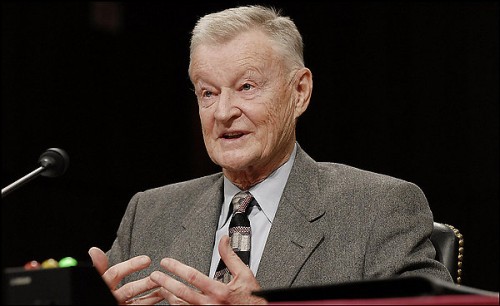
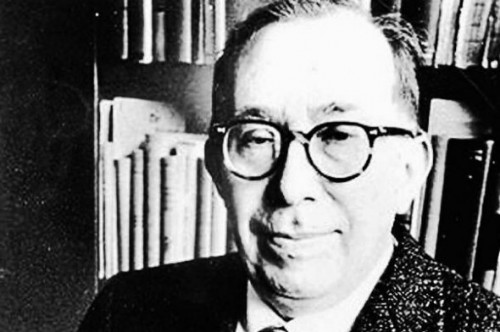



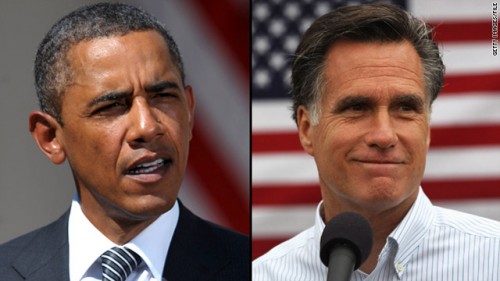
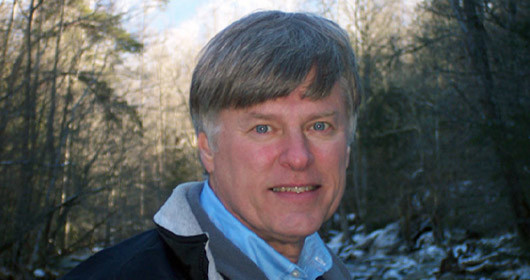
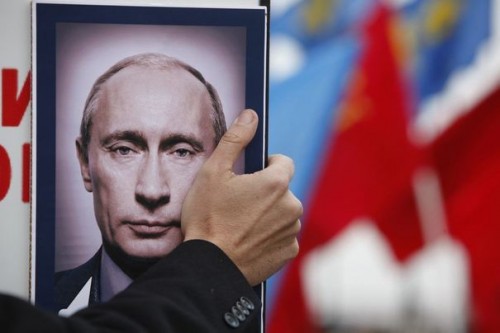
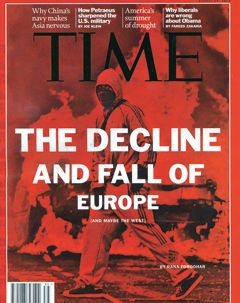


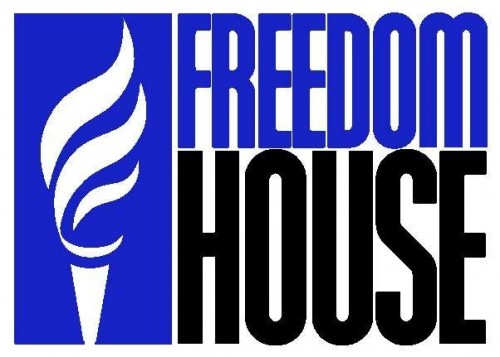

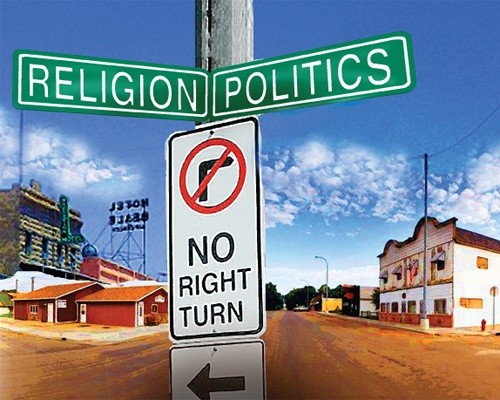
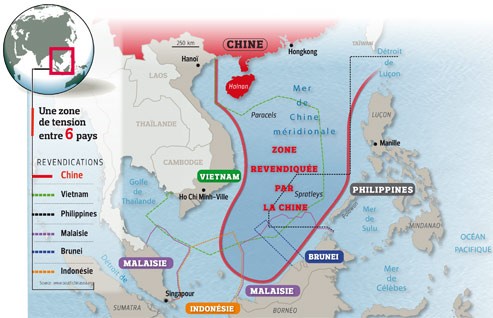
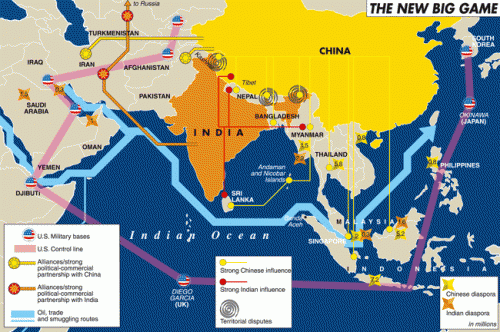
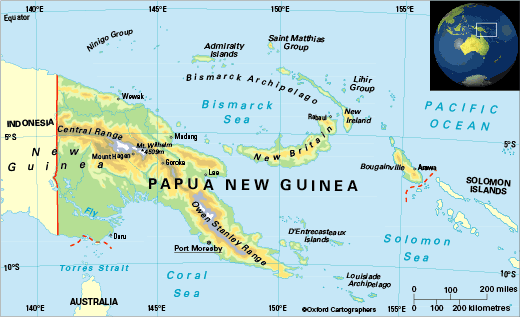
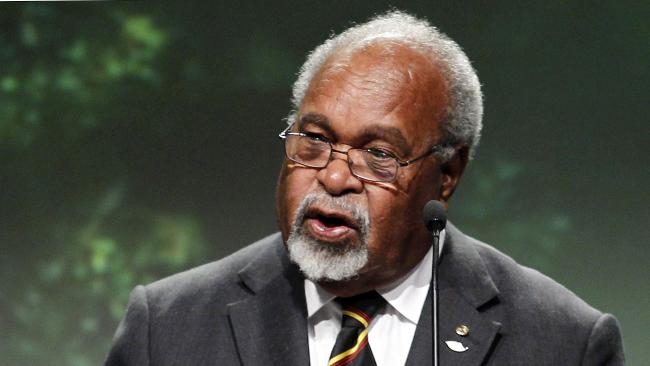 Somare e O’Neill settimana scorsa si erano così ritrovati a capo di due gabinetti ed entrambi avevano nominato un proprio capo della polizia. In questa situazione, le tensioni nel paese erano salite alle stelle, con l’esercito e le forze di polizia chiamate a presidiare le strade della capitale, Port Moresby, per timore di possibili disordini. Nella serata del 12 dicembre, le inquietudini avevano raggiunto il culmine, quando la polizia fedele a Somare aveva impedito a O’Neill l’accesso al palazzo del Governatore Generale, Michael Ogio.
Somare e O’Neill settimana scorsa si erano così ritrovati a capo di due gabinetti ed entrambi avevano nominato un proprio capo della polizia. In questa situazione, le tensioni nel paese erano salite alle stelle, con l’esercito e le forze di polizia chiamate a presidiare le strade della capitale, Port Moresby, per timore di possibili disordini. Nella serata del 12 dicembre, le inquietudini avevano raggiunto il culmine, quando la polizia fedele a Somare aveva impedito a O’Neill l’accesso al palazzo del Governatore Generale, Michael Ogio.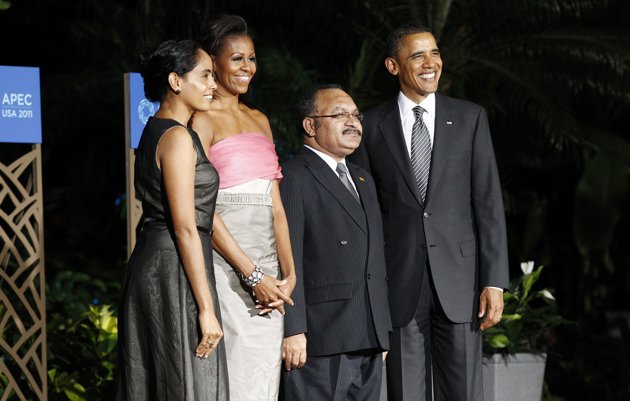 A risultare decisiva per la sorte di Michael Somare è stata in particolare la sua politica filo-cinese, che in questi ultimi anni ha complicato non poco i suoi rapporti con l’ex potenza coloniale, l’Australia. Grazie alle aperture di Somare verso Pechino, la Cina ricopre oggi un ruolo importante nel redditizio settore minerario della Papua Nuova Guinea. Uno dei progetti più ambiziosi assegnati ai cinesi è quello da 1,6 miliardi di dollari, che prevede lo sfruttamento della miniera Ramu, dove si estrae nickel e cobalto.
A risultare decisiva per la sorte di Michael Somare è stata in particolare la sua politica filo-cinese, che in questi ultimi anni ha complicato non poco i suoi rapporti con l’ex potenza coloniale, l’Australia. Grazie alle aperture di Somare verso Pechino, la Cina ricopre oggi un ruolo importante nel redditizio settore minerario della Papua Nuova Guinea. Uno dei progetti più ambiziosi assegnati ai cinesi è quello da 1,6 miliardi di dollari, che prevede lo sfruttamento della miniera Ramu, dove si estrae nickel e cobalto.
Ex: http://mediabenews.wordpress.com/
par Mohamed SIFAOUI